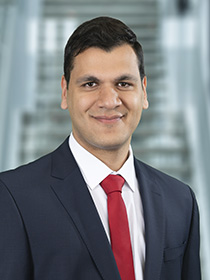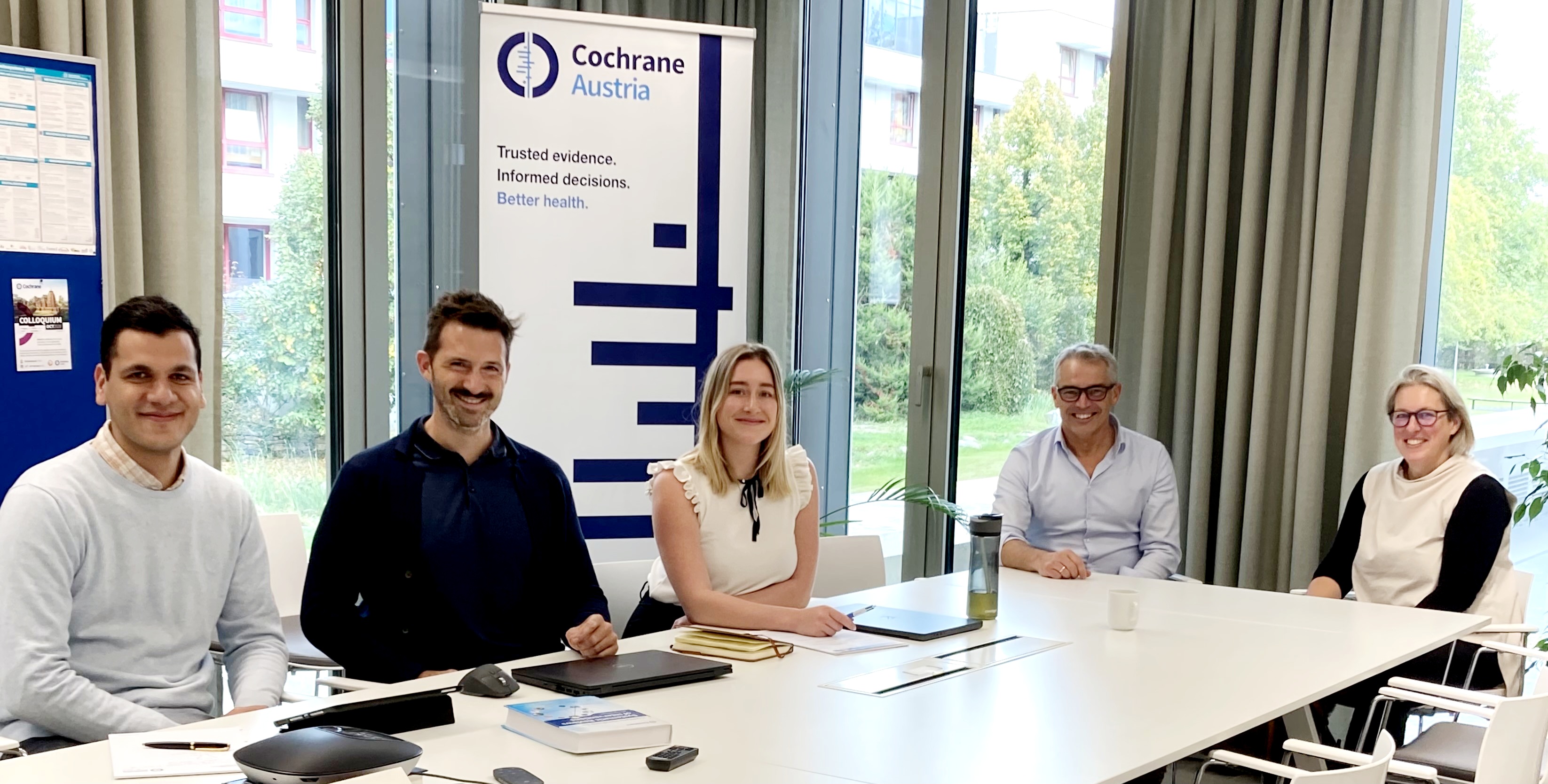-
Graduation
Doctor of Philosophy - PhD
-
ECTS-Points
180
-
Learning format
-
Duration
6 semesters
-
Admission requirements
According to curriculum
-
Language
English
-
Study location
Krems (AT)
-
Curriculum
-

The production of evidence syntheses is methodologically complex and dynamically evolving. Current challenges include combining data from different types of studies, using direct or indirect comparisons (network meta-analyses), presenting the benefits and risks of an intervention in an understandable way, and assessing and incorporating the values and preferences of the users of evidence syntheses. In addition, there are new, but as yet untested, possibilities for using artificial intelligence to automate individual processes in evidence syntheses.
Our PhD program in "Applied Evidence Synthesis in Health Research" will be the first to offer students the opportunity to specifically address these methodological challenges over a period of three years.
Evidence syntheses and their methodological challenges are a central scientific focus of the Department of Evidence-Based Medicine and Evaluation. The methodological development and application of evidence syntheses is supported by numerous international collaborations. Cochrane Austria and the WHO Collaborating Centre for Evidence-based Medicine are based in the Department.

Advancing expertise in evidence synthesis - from initial concept to real-world application. Our PhD program provides rigorous mentorship, cultivating talented researchers committed to the highest standards in health research.
Univ.-Prof. Dr. Gerald Gartlehner, MPH
PhD Coordinator
Any questions?
We’re here to help.

Gabriele Inzinger, MSc
Administrative Assistant
Or contact us directly.
Benefit from our PhD program
- The PhD program "Applied Evidence Synthesis in Health Research" pairs an innovative curriculum with hands-on research at the University for Continuing Education Krems.
- It provides a platform for collaboration and exchange between established researchers and offers a rich learning environment and active support for PhD candidates in the field of health science research.
- Students are involved in externally funded projects at the University for Continuing Education Krems (subject to funding availability) setting the stage for a future in independent research.
-
accredited/certified
-
international
-
networking
Accreditation
In 2015, the Agency for Quality Assurance and Accreditation (AQ Austria) accredited the first two PhD programs at the University for Continuing Education Krems: “Migration Studies” and “Regenerative Medicine”. This made the University for Continuing Education Krems one of the first public universities in Austria to have its PhD programs accredited according to international standards. In 2021, the PhD program "Technology, Innovation and Cohesive Societies" was also successfully accredited by AQ Austria. Most recently, the PhD program "Applied Evidence Synthesis in Health Research" was accredited by AQ-Austria in December 2023.
Curriculum
The PhD program "Applied Evidence Synthesis in Health Research" spans three-years, divided into six semesters, and encompasses a total of 180 ECTS points. Of these, 35 ECTS points are allocated to coursework as follows: PhD colloquia: 6 ECTS points; compulsory modules: 17 ECTS points; and an elective area: 12 ECTS points. A significant portion of the program – 140 ECTS points – is dedicated to research and dissertation writing. An additional 5 ECTS points are reserved for the final examination.
As part of the PhD program "Applied Evidence in Health Research," the following mandatory and elective modules are to be completed.
-
Contents
Module 1 consists of 3 PhD colloquia, which are annual meetings with the PhD committee to discuss and assess the advancement of your research. The colloquia are held once a year and attendance is mandatory. For each colloquium, students prepare a presentation of their dissertation project and a corresponding progress report.
-
Contents
Module 2 promotes foundational skills essential for scientific work and includes the following courses:
- Good Scientific Practice, Research Integrity and Ethics (1 ECTS)
- Project management and grant acquisition (1 ECTS)
- Scientific Presentations, Scientific Writing, Peer Review and Publications (0,5 ECTS)
- Theory of Teaching and Didactics (0,5 ECTS)
-
Contents
Module 3 covers statistical methods, data analysis, modeling, and an introduction to the free programming language R for statistical computing and graphic and includes the following courses:
- Statistics for the Life Sciences (2 ECTS)
- Statistics for Evidence-based Healthcare (1 ECTS)
- Data Analysis with R (1 ECTS)
- Introduction to Modelling for Healthcare (2 ECTS)
-
Contents
Module 4 covers the core content of the PhD program. It provides knowledge about the methods of different types of evidence synthesis and how these methods can be used in health care. Students learn how to conduct methodologically valid systematic reviews and meta-analyses according to the Cochrane methodology. The methods of diagnostic and prognostic reviews and network meta-analyses are also covered. The module also introduces the essentials of graphical risk and effect plots and consists of the following courses:
- Methods of Evidence Synthesis (4 ECTS)
- Evidence-informed Decision Making in Healthcare and Health Policy (1 ECTS)
- Systematic Literature Searches and Information Retrieval (1 ECTS)
- Presentation and Visualization of Risks and Treatment Effects (1 ECTS)
- Certainty of Evidence and Guideline Development (1 ECTS)
-
Contents
Module 5 is designed to further deepen students' understanding of their dissertation topic. Additionally, the module affords the chance to gain international exposure through the Cochrane International Mobility Program. It also offers hands-on experience in academic teaching, advising on bachelor's theses, and participation in other university-related activities such as conferences. The module allows for considerable flexibility in its design, with elective courses to be finalized in the dissertation agreement. A total of 12 ECTS credits are required for completion. The following courses are available for selection:
- Cochrane International Mobility I-II (4/6 ECTS)
- Teaching or University-related Activities I-III (ECTS credits are allocated by the program director based on the nature of the activity)
- Journal Club I-III (je 2 ECTS)
- Survey Research and Questionnaire Design (1 ECTS)
- Qualitative Methods (1 ECTS)
- Evaluation Research (1 ECTS)
- Evidence-based Public Health (1 ECTS)
- Registries and Analyses of Registry Data (2 ECTS)
- Modelling Approaches for Health Technology Assessments (2 ECTS)
- Selected Methods of Evidence Synthesis or other topic-specific courses (ECTS credits depend on the chosen course)
Team
PhD Coordinator
Core Faculty
Univ.-Prof. Dr. Gerald Gartlehner, MPH
Head of Department - Department for Evidence-based Medicine and Evaluation
Univ.-Prof. Dr. Stefanie Auer
Head of Department - Department for Dementia Research and Nursing Science
Priv.-Doz. Mag. Dr. Raimund Kovacevic
Extended faculty
Assoc.-Prof. Priv.-Doz. Dipl.-Math.oec. Dr.rer.soc.oec. Beate Jahn
Senior Scientist
Univ.-Prof. Priv.-Doz. Dr. med. Kathryn Hoffmann, MPH
Head of Department Primary Care Medicine
Students & Projects
The study program serves as a collaborative platform for seasoned researchers, aiming to optimally enhance students' skills. Students will actively participate in externally funded research projects at the University for Continuing Education Krems.
Dominic Ledinger
Title of dissertation: DEEP INSIGHTS: Determining research priorities and exploring the impact of knowledge user involvement and engagement in the evidence synthesis process
Supervisor: Gerald Gartlehner
Arianna Gadinger
Title of dissertation: SMART QES: : Streamlined Methods for Accelerated Rapid Techniques for Qualitative Evidence Synthesis
Supervisor: Gerald Gartlehner

Amin Sharifan
Title of dissertation: Determining the direction of effect of statistically nonsignificant effect estimates
Supervisor: Gerald Gartlehner
 Anna Mengl
Anna Mengl
Title of dissertation: Validity and Clinical Meaningfulness of Revision Indicators in Hip and Knee Arthroplasty: Integrating International Evidence, Routine Data and Expert Consensus
Supervisor: Gerald Gartlehner
Susan Banda
Supervisor: Barbara Nußbaumer-Streit

Downloads
Application
Admission to the PhD program "Applied Evidence Synthesis in Health Research" follows a two-stage process:
- Announcement of third-party-funded PhD positions
- Selection procedure by the PhD Commission
We regret to inform you that we do not have any vacancies available at this time.
PhD students are generally employed on the basis of research projects with third-party funding (FWF reference rates). The PhD Commission selects students on the basis of their application documents and the presentation of their dissertation project.
Required application documents are
- Curriculum Vitae
- Proof of identity (passport, identity card)
- Final degree certificate
- Degree, diploma or master's degree certificate
- Summary of research idea
- Letter of motivation
- Recommendation letters and references
Students will be admitted to the program once all requirements have been met.
Tags
-UWK-Walter-Skokanitsch-2.jpg)




